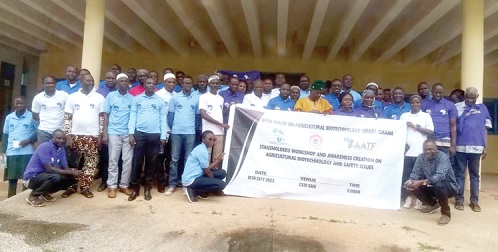
We are making strides to release GM cowpea varieties - Scientists assure
Scientists at the Savannah Agriculture Research Institute of the Council for Scientific and Industrial Research (CSIR-SARI) say they are making significant strides to release the first locally developed genetically modified (GM) varieties of cowpea (beans) by next year.
After a year of research, the GM cowpea seeds received the National Biosafety Authority’s (NBA’s) approval last year for environmental release.
Currently, the various varieties of the crop are undergoing release trials on fields to enable their presentation for approval from the National Variety Release and Registration Committee (NVRRC) to pave way for commercial cultivation.
A Senior Research Scientist at the Science and Technology Policy Research Institute (STEPRI) of CSIR, Dr Richard Ampadu-Ameyaw, who disclosed this, said barring unforeseen circumstances the crop would be released to farmers for cultivation by next year.
He said the research institute was keenly following the laid down regulations to ensure the quality and safety of the crop being developed for consumption.
Workshop
Dr Ampadu-Ameyaw said this in an interview with the Daily Graphic on the sidelines of a workshop on biotechnology organised for farmers and various stakeholders at Nyankpala in the Northern Region.
Organised by the Open Forum on Agriculture Biotechnology (OFAB) Ghana in collaboration with CSIR and Africa Agricultural Technology Foundation (AATF), the event seeks to create awareness of biotechnology and genetically modified organisms and Ghana’s journey in the development of local GM cowpea.
Breakthrough
When approved and commercialised, the GM cowpea is expected to help increase the production of the crop, strengthen the country’s food security and help to reduce the prices of the crop, a major staple in the country.
The crop, which is known as BT cowpea, has an in-built resistance to pest attacks and climate change.
It is being developed using traits from the fungus known as Bacillus therigiensis (Bt) in the cowpea crop.
Dr Ampadu-Ameyaw, who is also the Coordinator for OFAB Ghana, said the cowpea sector would receive a major boost when the crop was finally commercialised as it exhibited very high levels of resistance to the legume pod borer which was responsible for up to 80 per cent of yield losses on farmers’ cowpea fields.
“It has a lot of socio-economic benefits because with the crop, pesticides spraying will be reduced, which is good for both human health and the soil structure,” he noted.
Remedy
For his part, a Research Scientist at the Biotechnology and Nuclear Agriculture Research Institute of the Ghana Atomic Energy Commission, Dr Daniel Osei Ofosu, said the GM cowpea was the surest remedy to the insect infestation and low yield being recorded by farmers using the conventional variety.
“In this 70-day cycle of the growing of cowpea, it faces a lot of challenges and one of such is insect infestation.
Every day farmers have to spray, which is a lot of work and also affects their health” he said.
The Deputy Director of the Savannah Agriculture Research Institute (SARI), Dr Issah Sugri, said agricultural biotechnology had been identified as one potent weapon to tackle the challenges facing farmers in the country, and added that biotechnology crops could make farming more profitable by increasing crops quality.
He, therefore, admonished all stakeholders, particularly farmers, to embrace the novel crop when it was finally commercialised so as to help boost cowpea production in the country.
